Iran’s Speaker Criticized for Election-Time Promises on Afghan Migrant Issue
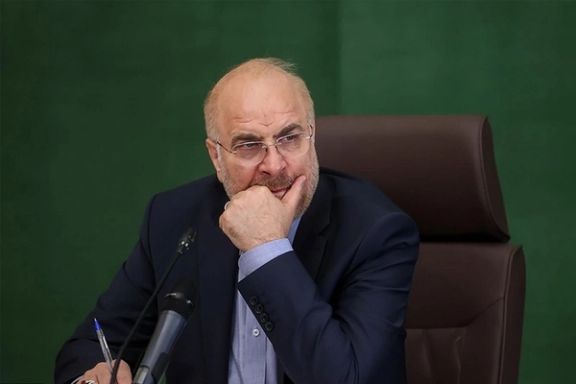
The reformist newspaper Ham-Mihan has called out the Speaker of the Iranian Parliament for his presidential election campaign rhetoric concerning Afghan migrants.

The reformist newspaper Ham-Mihan has called out the Speaker of the Iranian Parliament for his presidential election campaign rhetoric concerning Afghan migrants.
Mohammad Bagher Ghalibaf recently promised that "provisions have been made for the complete expulsion" of illegal immigrants while numbers have continued to grow with around eight million in the country.
Ham-Mihan voiced a question: "If this issue is so important that it requires promises to win votes, then why haven’t you presented any ideas, opinions, or serious critiques about it in the past four years, and why haven’t you pursued and implemented the issue in any of the institutions where you were present? Is this way of making promises a sign of sincerity?"
The timing of Ghalibaf's statements coincides with a surge in the detention and expulsion of foreign nationals, particularly Afghan citizens, from Iran. This has sparked a complex debate among Iranian citizens and officials, balancing the perceived threats and opportunities presented by the presence of Afghan migrants.
Despite the approximate figure of 780,000 Afghans in Iran with official refugee status, the majority remain undocumented, a significant number seeking refuge from the instability in Afghanistan, particularly following the resurgence of the Taliban.
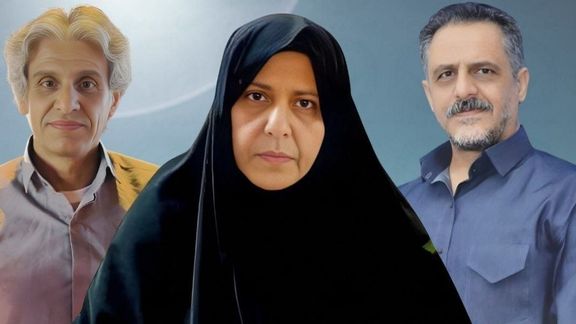
Fatemeh Sepehri, a prominent Iranian political prisoner and vocal critic of the Islamic Republic who suffers from a heart ailment, has been sentenced to an additional 18 and a half years in prison.
The harsh ruling underscores the Islamic Republic’s ongoing crackdown on dissent. Sepehri’s brothers, Mohammad-Hossein Sepehri and Hossein Sepehri, have also received severe sentences, facing 8 and 5.5 years in prison, respectively.
Sepehri, who is a widely revered figure among Iranian dissidents, apparently received the long sentence for condemning Hamas’s October 7 attack on Israel. Despite facing prison and ill health, she issued a statement supporting the Israeli people, who were massacred, tortured, sexually assaulted, and taken hostage by Hamas. This was a clear act of defiance against the Islamic regime in Iran that staunchly supports Hamas.
The sentences were handed down by Judge Hossein Yazdankhah of Branch 5 of the Mashhad Revolutionary Court following the court's second session on June 6. This information was announced by the siblings' brother, Asghar Sepehri on the social media platform X.
According to Asghar Sepehri, the charges against Fatemeh are extensive and severe. She has been sentenced to a total of 18.5 years in prison on multiple charges: 7 years for supporting Israel, another 7 years for gathering and collusion to conspire against national security, 3 years for insulting Supreme Leader Ali Khamenei, and 1 year and six months for propaganda against the Islamic Republic.
Similarly, Mohammad-Hossein Sepehri faces significant charges. He has been sentenced to a total of 8 years in prison, comprising 5 years for assembly and collusion, 2 years for insulting Khamenei, and 1 year for propaganda activity against the regime.
Hossein Sepehri has also received a harsh sentence totaling 5 years and 6 months. His charges include 3 years and 7 months for gathering and collusion, 1 year and 4 months for insulting Khamenei, and 7 months for propaganda activity against the regime.
“They have built a case against our daughter resulting in 18 and half years imprisonment for condemning Hamas,” decried Sepehri’s elderly mother in a video shared on X.
Fatemeh Sepehri was already facing a lengthy prison sentence following her arrest in September 2022 amid Iran’s nationwide Woman Life Freedom protests. According to her mother when she was first arrested she spent over 30 days in the intelligence ministry’s detention undergoing interrogations before being transferred to Vakilabad prison. Her brother also previously reported of Sepehri being subject to “psychological torture by a judiciary psychiatrist” recently.
Despite being severely ill and having just had open heart surgery last year, she was promptly transferred back to prison following her surgery.
“After her open heart surgery, they took her from CCU to prison. In prison they closed the only window through which she could see the sky,” added Sepehri’s mother.
Her brothers, Mohammad Hossein, and Hossein were attending to their sister in hospital while she was having surgery when security forces arbitrarily arrested them.
“Hossein was in prison for 3 months and released on bail. Eight months have passed and now it is 9 months since Mohammad is in prison. Mohammad has not been able to speak a word. Hossein hasn’t released any statements, yet they filed a case against them [alleging] ‘you have spoken against us’ which they haven’t,” Sepehri’s mother stated.
Echoing his mother’s words, Asghar further added that his sister’s phone calls from prison are strictly monitored and she is being denied medical leave from prison.
“I condemn Hamas’s attack on Israel and say loudly that the Iranian nation stands by the Israeli nation. The Islamic Republic and its agents spend Iran’s wealth to buy bullets and attack Israel. We, the people of Iran neither want war nor the killing of defenseless people. I again condemn Hamas’s attack. Since the rise to power of Ali Khamenei and the founding of the Islamic Republic, the Middle East has not seen peace,” Sepehri had declared in her statement.

Iran's Acting Foreign Minister Ali Bagheri Kani claimed that Iran and Iraq are "two main pillars in the region" while Iran continues to destabilize Iraq through its Shia proxies.
During a joint press conference in Baghdad with his Iraqi counterpart Fuad Hussein on Thursday, he blamed the region’s instability on Iran’s archenemy, Israel, currently at war with Iran-backed Hamas in Gaza.
“All countries in the region are together with interaction and solidarity to build a secure and stable phase, and it is the Zionists who have shown that they are the main factor in the instability of the region, he said.
Iran’s largest proxy, Hezbollah, is currently at war with Israel on its northern border with Iran’s Yemeni proxy, the Houthis, targeting the country’s south with its Red Sea region blockade and a series of missile and drone attacks.
The latest assertion from Iran’s acting foreign minister came amidst widespread accusations of the regime’s role in destabilizing Iraq by supporting militia groups that challenge the sovereignty and governance of Iraq through its backing of Shiite armed groups.
Bagheri's trip includes high-level meetings with Iraqi officials, including Prime Minister Mohammed al-Sudani and President Abdul Latif Rashid, extending his outreach to the Kurdistan Region to engage with Kurdish leaders Nechirvan Barzani and Masoud Barzani.
The visit is part of a broader regional tour that previously included stops in Lebanon and Syria, where Bagheri met with figures such as Hezbollah chief Hassan Nasrallah and Syrian President Bashar al-Assad as Iran seeks to expand its influence across the region.
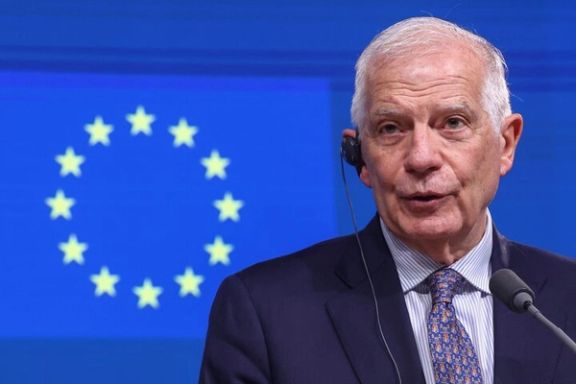
Josep Borrell, the European Union's Foreign Policy Chief, has demanded Iran release its European hostages, including an EU representative.
Following the phone call with Ali Bagheri-Kani, Iran's acting Foreign Minister, on Wednesday, Borrell said the two touched on several topics, in addition to the detention of the EU’s Johan Floderus.
"We had frank exchanges, including on issues pertaining to Iran’s nuclear program, the war in Gaza, and tensions at the Israel-Lebanon border,” he said.
He also used the opportunity to demand the release of European citizens currently imprisoned in Iran, reflecting ongoing European concerns over what many are calling Tehran’s “hostage diplomacy” tactics.
French President Emmanuel Macron announced on Wednesday the release of another French citizen, Louis Arnaud, previously imprisoned in Iran.
Foreign Minister Stephane Sejourne also said "Our diplomatic service is still at work" to free three other French citizens: Jacques Paris, Cecile Koller and a man named only as Olivier held in Iranian jails.
Arnaud's case had drawn significant media attention after his arrest in September 2022 during protests over the death of Mahsa Amini—a young Iranian Kurd who died in custody for allegedly violating hijab.
While Arnaud's companions were released shortly after their detention, he was sentenced in November 2022 on charges of “propaganda and harming Iranian state security.”
At the same time, On Monday, Tehran had announced ongoing efforts to secure the release of Bashir Biazar, a former managing director of Iran's state broadcaster who has been detained in France and is awaiting deportation.
Nasser Kanaani, the spokesperson for the Iranian Foreign Ministry, said Monday that diplomatic actions have been taken since the moment they were informed of Biazar’s arrest, without elaborating further.
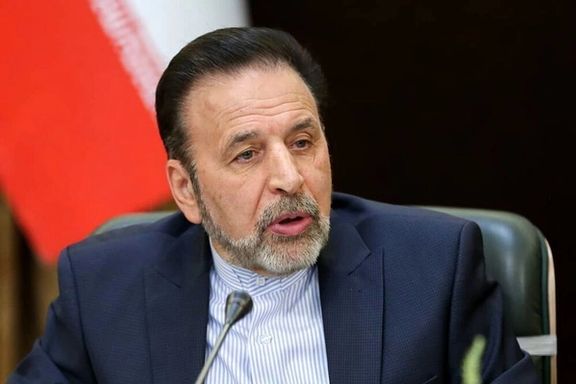
Mahmoud Vaezi, the former Chief of Staff to ex-President Hassan Rouhani, has openly critiqued Masoud Pezeshkian's stance on reform ahead of the presidential elections scheduled for June 28.
Vaezi's comments on the only pro-reform candidate in the race highlight the importance of candidates’ allegiance to the Supreme Leader, Ali Khamenei, in order to succeed.
“Pezeshkian must clearly tell the people that I have been seeking 'change' from the past, and today the opportunity has arisen for change to occur in people's lives," Vaezi remarked amid Iran’s economic crisis and the worst social crackdowns in the history of the Islamic Republic.
Further underlining the expectations placed on Pezeshkian, Vaezi shared that many are urging him to facilitate an endorsement from former President Rouhani. "Many people talk to me, asking me to speak to Former President Hassan Rouhani so that he supports Pezeshkian. This is what the people tell us... We hope that the candidate himself will more clearly reflect to the people what is necessary for change," Vaezi added.
However, skepticism about Pezeshkian’s potential for genuine reform is growing with five of the six candidates staunchly pro-regime. His recent televised interview, which focused primarily on economic issues without touching on more contentious subjects such as foreign policy, the nuclear program, or the mandatory hijab law, has left many supporters disillusioned as the country cries out for change.
Critics argue that his avoidance of critical topics indicates a potential alignment with the prevailing views rather than a departure from them if he is to stand a chance in the upcoming polls which follow the sudden death of Ebrahim Raisi in a helicopter crash last month.
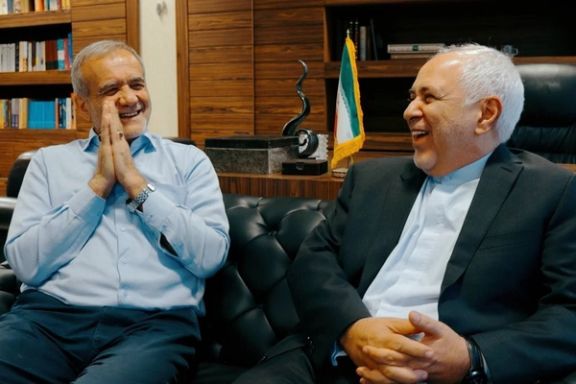
Iran’s proreform presidential candidate Massoud Pezeshkian held a meeting with former foreign minister Mohammad Javad Zarif, after reports that he might choose the former diplomat as his foreign minister in case of victory in the June 28 vote.
Iranian media reported on the meeting on Thursday without offering much detail. “Zarif provided an analysis of the country's foreign policy situation and recent ups and downs, sharing his views on international relations,” the conservative Mehr News reported.
Pezeshkian has refrained from expressing his views on foreign policy since being approved on Sunday as one of six hand-picked regime insiders allowed to run for president. However, in the past he has expressed support for the 2015 nuclear deal and for the need to achieve a new agreement.
Local media reported that “Pezeshkian also shared his views on diplomacy, emphasizing the need to move towards opening new horizons in foreign policy,” during the meeting with Zarif.
All candidates have so far avoided the issues of foreign policy, crippling sanctions and reaching a deal with the West over Tehran’s fast-expanding nuclear program. While they speak about Iran’s economic vows, they offer domestic solutions, none of the candidates has referred to a foreign policy shift in order to reduce or remove US oil export and other sanctions.